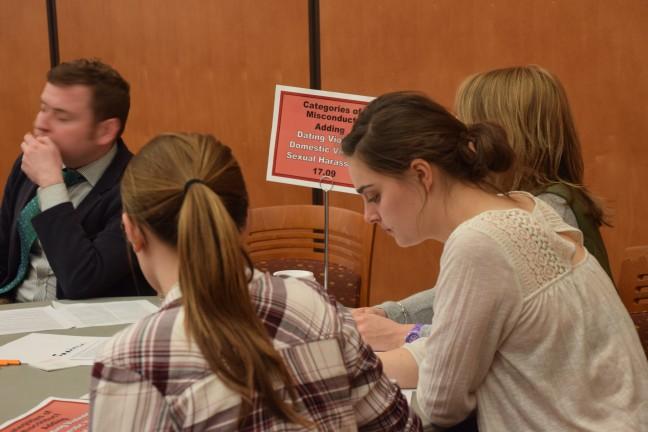Sexual assault, and specifically how universities should handle it, is one of the most challenging non-fiscal problems facing higher education today. Singing racist songs and “honor code violations,” like plagiarism, are quick ways to get booted from campus. But across the U.S., universities are often slow to decisively punish perpetrators of more violent crimes, if they even act on it at all.
One of the unfortunate problems with covering stories of sexual assault is that each time we learn of an accusation that lacked evidence or find out one was fabricated, a skeptical lens clouds our view. Similarly, even when there is clear evidence of guilt, accusations can end up obstructed due to shaky policies and universities that are ill-equipped to actually conduct an investigation with the legal implications and seriousness of a sexual assault.
The biggest challenge for universities, who are better equipped for academic investigations than criminal ones, is punishing perpetrators of sexual assault. The solution to this problem is simple: Universities should have the local police departments conduct all aspects of the investigation.
There is a national effort to construct a university-level response for rape and sexual assault. For example, Harvard changed its sexual assault policy to create an internal investigative board for quick responses to campus complaints.
University of Wisconsin has also relied on separate investigations where the university’s investigating official could read the police report as part of making a decision on punishment, but the investigation process itself is unconnected.
This is a dangerous idea, and police departments, who have the expertise and require legal evidence, should conduct the actual investigations, not a university. There is an inherently criminal aspect of sexual assault, so the investigation should also be criminal in nature.
As UW professor Anne McClintock proposed at a recent forum on UW’s responses to sexual assault, a zero tolerance policy regarding rape is a great idea. But there needs to be firm investigation procedures in place to ensure UW appropriately uses the policy. UW and universities in general do not have the experience or expertise to conduct what is essentially a criminal investigation and should leave that to the police departments.
Forum ‘confronts campus rape,’ outlines actions UW should take
In addition to a zero tolerance policy, which the University of Virginia instituted after the now-retracted Rolling Stone article exposing sexual assault on their campus, the university should also be obligated to report cases of sexual assault to law enforcement in the same way high school teachers and counselors are required to report child abuse and neglect. Wisconsin law currently requires university employees to report sexual assault cases to the dean of students for further investigation, but these reports do not constitute criminal reports. The university is not under any obligation to pursue criminal complaints unless the student requests it.
Punishments for sexual assault perpetrators are strictly limited to academic sanctions under Chapter 17, which regulates nonacademic student misconduct. When police are involved, they can refer individual cases to the county for prosecution, and county prosecutors can then pursue criminal charges.
I understand this could have a chilling effect on victims coming forward. But universities across the country are under fire for potentially mishandling sexual assault complaints, and linking up with local law enforcement is a better method. Even if the victim does not press charges, reporting the information allows the police and university to be better prepared for situations if the victim does. The best muscles are the ones frequently flexed.
Department of Education puts UW under investigation for handling of sexual assault complaints
In my ideal world, prosecutors would also seek those academic sanctions, and it could all be self-contained in one process.
The university straddles a tough line. There are legitimate legal concerns of having overly strict policies that exact punishment on the accused before the matters are appropriately investigated. Harvard Law professors decried that their university’s reforms are “starkly one-sided” and claimed they fail to provide enough legal protections for the accused. Conversely, too much protection discourages victims from coming forward and allows actual rapists to manipulate the legal system to their benefit.
UW is in a difficult position, but it can strengthen its sexual assault policies with a more formal campus engagement with the Madison police departments to conduct investigations and levy punishment. The university itself is not a police entity, and we should not trust our university officials, who are quite good at investigating plagiarism or academic misconduct, to adequately conduct criminal investigations.
Historically, in university sexual assault investigations, the burden has been on the victim to prove their story more so than in a criminal investigation. Let’s marry the processes and prevent that ambiguity.
UW should create a strong zero tolerance policy and create new investigation methods to enforce the new policy. With the phenomenal resources in place at the Rape Crisis Center, University Health Services and other organizations, UW can do quite a bit to prevent and punish sexual assault on campus. Sexual violence on campus won’t end with these new policies, but decisive and smart action is needed to start the process in the right direction.
Adam Johnson ([email protected]) is a Master’s candidate at the La Follette School of Public Affairs.








